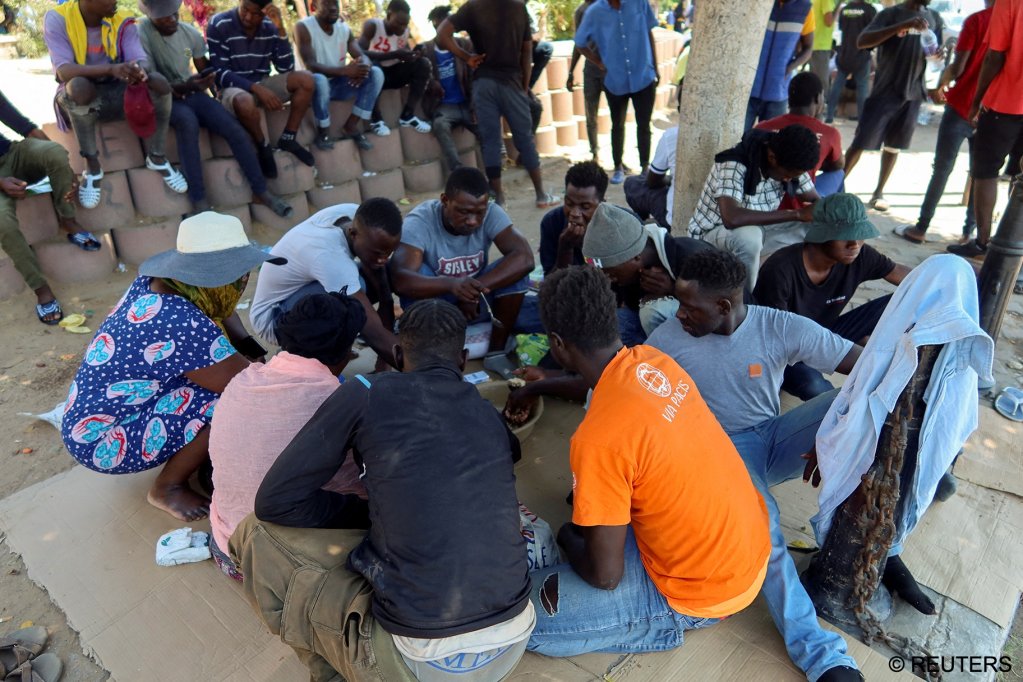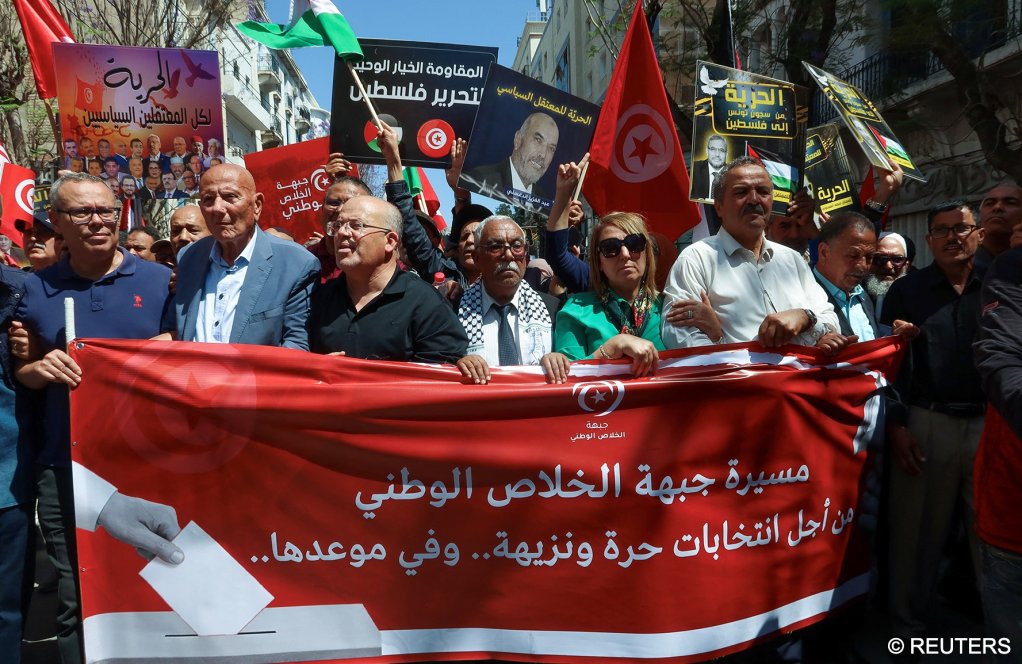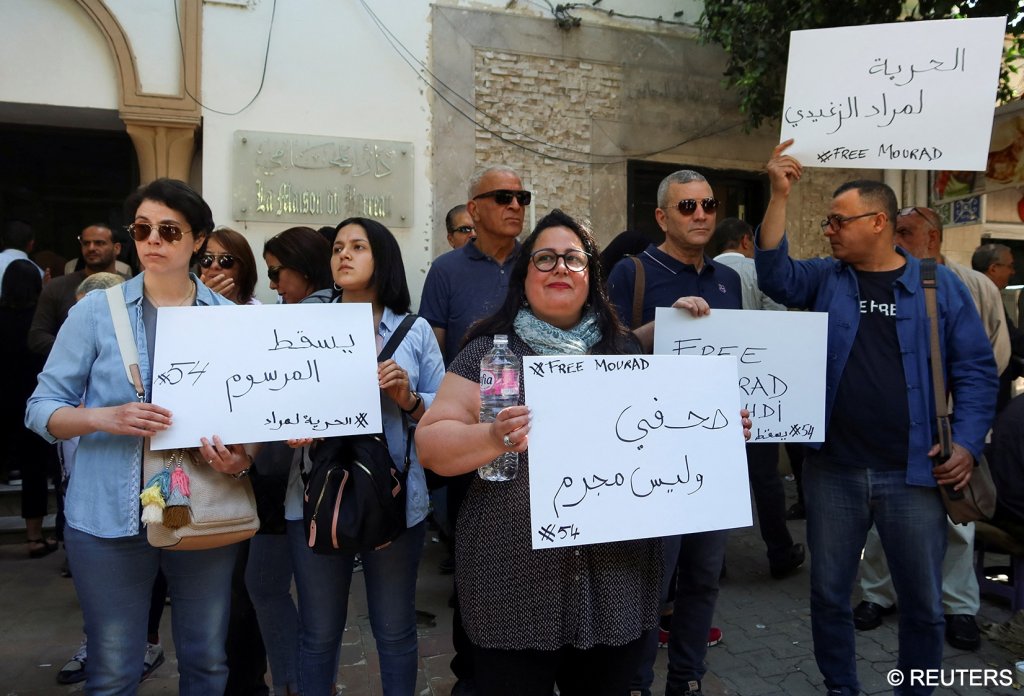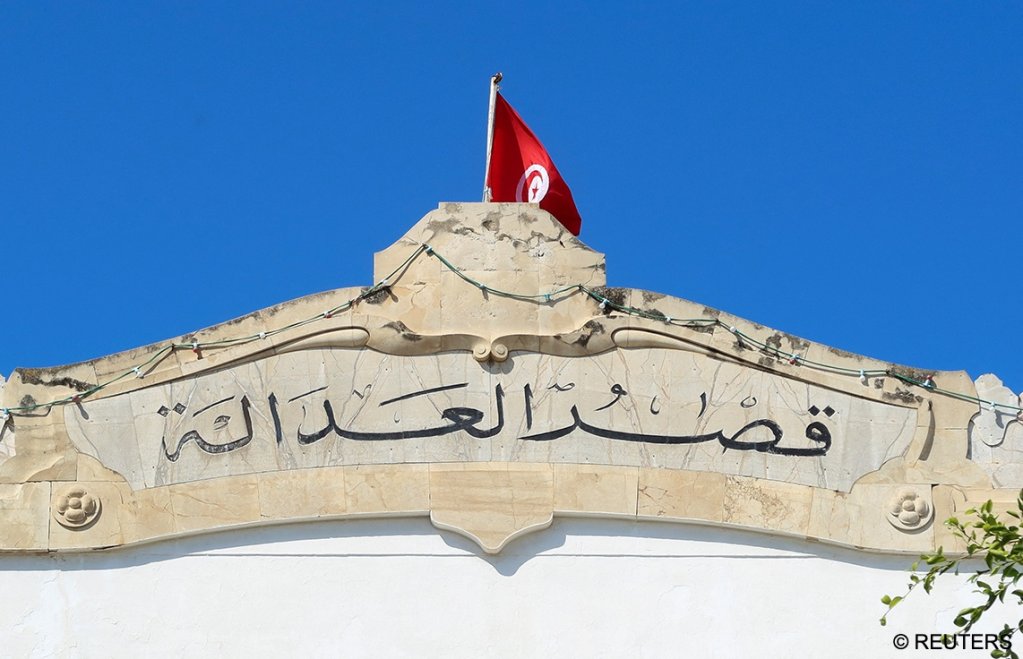On Monday, Tunisian police arrested a second lawyer who is a well-known critic of the President. The EU has expressed concern at the spate of arrests of prominent critics and activists, many of whom had spoken out against the increasingly harsh climate for migrants in the North African country.
Witnesses were reportedly "screaming," after Tunisian police stormed the offices of the Tunisian bar association headquarters on Monday (May 13) and arrested a prominent lawyer and critic of President Kais Saied and his migration policies.
According to the news agency Reuters, a live broadcast on the media website TUNMEDIA showed "videos of broken glass doors and toppled chairs," as Mahdi Zagrouba was being arrested.
One lawyer who witnessed Zagrouba’s arrest, Kalthom Kanou, described it as a "horror scene." Police dragged Zagrouba to the ground, "before some of them returned to smash the door glass," Kanou said according to Reuters.
A statement from Tunisia’s interior minister said that Zagrouba’s arrest was due to "a judicial decision against Zagrouba … due to his physical and verbal assault on two policemen today near the courtroom."
Just two days earlier, on Saturday, the police had performed a similar operation in the same building to arrest another lawyer, Sonia Dahmani.
Under arrest for 'inciting hate speech'
According to her lawyers, Dahmani is under investigation for disseminating "false information with the aim of undermining public safety" and "inciting hate speech" under Decree 54, a law signed by Saied in September 2022 designed to "combat false information and rumors", reported French state news channel France 24. Anyone found to be spreading information deemed "false" under this decree could face up to five years in prison, and a fine of up to 50,000 Tunisian dinars (about 14,770 euros).
Extracts from Dahmani's arrest were also posted on the Qatari broadcaster Al Jazeera, showing masked men storming the office, trying to prevent the cameras already there filming the protests, from continuing to film and then pushing past the crowds to extract the lawyer from their offices. The footage stemmed originally from France 24 who were in the middle of a live broadcast when the police arrived. They posted an extract from the confusion on their X page on May 13.
In the video, the reporter can be heard telling the masked men that they can't attack her cameraman as the camera is clearly being pushed around and reappears later amid shouts and distress from the crowd of people. France 24 reported that police had torn the camera from its tripod during the raid.
Also read: Tunisia arrests human rights activist who defended migrants
Head of bar association urges end of 'abuse of power'
Some opposition parties in Tunisia have described the lawyers' arrests as a "major escalation" reported Reuters. Hatem Meziou, the head of the Tunisian bar association, has urged an end to "abuse of power" in the country. Meziou told a news conference on Monday that everyone has "the right to defense without power abuse or resorting to violence," reported the French news agency Agence France Presse (AFP).
Meziou called on President Saied to "urgently intervene," calling the arrests heavy-handed and said they showed "disrespect to the [legal] profession."
Last week, Dahmani had said on a television program that life in Tunisia was not pleasant. She had been commenting, reported Reuters, on a speech given by Saied, in which he claimed once again that there was an international conspiracy to try and persuade thousands of undocumented sub-Saharan African migrants to settle in Tunisia.

Bilateral agreements and disagreements on migration
Saied has repeatedly declared to the EU and the international community that he will not accept third-country repatriations and will also not entertain the setting up of Albanian-style or Rwandan-style processing centers for asylum seekers who had hoped to enter the EU.
Last summer, he did however sign a deal with the EU where he was promised a billion euros in development aid and support in return for increased monitoring of Tunisia’s coasts by the National Guard, which has received funding, training, and support from the EU.
In October, it was reported that Tunisia returned at least 60 million euros of that funding amid escalating tensions over the expectations associated with the funding and the management of migration on both sides.
Also read: Italy's Meloni in Libya to talk migration
Since last year, Saied has made frequent rhetorical attacks against migrants. He blames them for many of the country's economic and even political woes, and has said repeatedly that he doesn't want the country being changed by migration from abroad.
In recent months, the number of reported clearances of migrants in camps and houses around the country has increased.
Some migrants, expelled from their homes, have reportedly been bussed to Tunisia's borders with Algeria and Libya and abandoned in desert regions without food or water.

Arrests of critics
Two journalists, Mourad Zghidi and Borhen Bsaiss, were also taken into custody on Saturday. Their detention was prolonged by Tunisia’s public prosecutor on Monday. They were arrested due to comments they made on the radio and in social media posts, reported Reuters.
The organization Reporters without Borders (RSF) has also denounced the wave of arrests and "escalating repression" in a post on X. They call for the immediate liberation of journalists Borhen Bsaies and Mourad Zeghidi, who were also arrested on Saturday.
A political scientist Vincent Geisser, a research fellow at France’s National Center for Scientific Research (CNRS), said to France 24. "The authorities are increasingly targeting anyone who expresses anything even remotely ironic, critical or independent of the regime. These actions aim to stifle any form of expression, even what is not necessarily perceived as oppositional or dissident from the outset."

Anti-migrant stance of president at the heart of repression think analysts
Although Saied was elected democratically in 2019, he shut down the parliament and granted himself additional powers in 2021. Since then, he has ruled by decree. Once he assumed authority over the judiciary, some in the opposition have said that he has taken power by coup.
"We are witnessing a turning point as repression accelerates in Tunisia," Sophie Bessis, a historian specializing in the Maghreb, said to France 24. "There are presently no signs that this repressive drift will abate."
Saied's anti-migrant stance is at the heart of this repressive push, think analysts like Geisser. The president has attacked associations and NGOs, claiming that they receive "astronomical" funding from abroad to facilitate the settlement of sub-Saharan migrants. He also said that although migrants are "victims of an entire system, Tunisia is not responsible for their misery," reported the online Tunisian news portal Business News.
Also read: Tunisia, accusations of clearances and expulsions
"Today, people are becoming very cautious about speaking out, whether on social media, in the [traditional] media or even in public spaces," explains Geisser. "The fear of denunciation and arrest is provoking the return of self-censorship in Tunisian society."
"Fear and resignation prevail among those who might oppose the regime because they don't perceive the democratic opposition as a credible alternative."
EU expresses 'concern' over arrests
The European Union expressed its "concern" over the arrests on Tuesday (May 14). "The European Union has followed with concern recent developments in Tunisia, in particular the concomitant arrests of several civil society figures, journalists and political actors," an EU spokesperson told the French news agency Agence France Presse (AFP).
Cooperation between various EU countries, including Italy, France and Germany, and Tunisia is ongoing. On December 20, 2023, the EU Commission posted a confirmation of the "budgetary support" the bloc provides to Tunisia. According to that press statement, the EU has agreed to pay 150 million euros directly into the Tunisian treasury "to assist the country's government in its efforts to achieve stable, inclusive economic growth that benefits the people of Tunisia."
InfoMigrants approached the EU Commission on Wednesday (May 15) for a comment on whether it has, or will change its agreements with Tunisia in the light of the "concern" it has expressed. They sent their statement of concern in French. In the middle of the statement, they underline that respect for human rights is guaranteed by the Tunisian constitution and forms "the basis on which cooperation with the EU is predicated." InfoMigrants asked the EU Commission if that meant that a failure to respect those rights would result in a change of policy? At the time of writing, they had not yet replied.

Colleagues call for release
On Monday, colleagues and relatives of the journalist Mourad Zghidi called for his and his colleague's release outside the building of the Tunisian order of lawyers, reported Al Jazeera.
While activists have more general criticisms of the political situation in their country, migration currently plays a central role in Tunisia. Before her arrest on Saturday, the lawyer Dahmani pointed out that Tunisia must have problems if "half of its youth want to leave," reported Al Jazeera. She said that a plummeting standard of living was causing Tunisian young people to exit as fast as they could in the hope of finding better opportunities in Europe.
According to Italian government data, Tunisians make up the third largest group of nationals arriving in Italy by boat since the beginning of 2024, followed by Bangladeshis and Syrians. Last year, Tunisia took over from Libya as the most popular jumping-off point for migrants of all nationalities hoping to cross the Mediterranean toward Europe.
With Reuters and AFP
